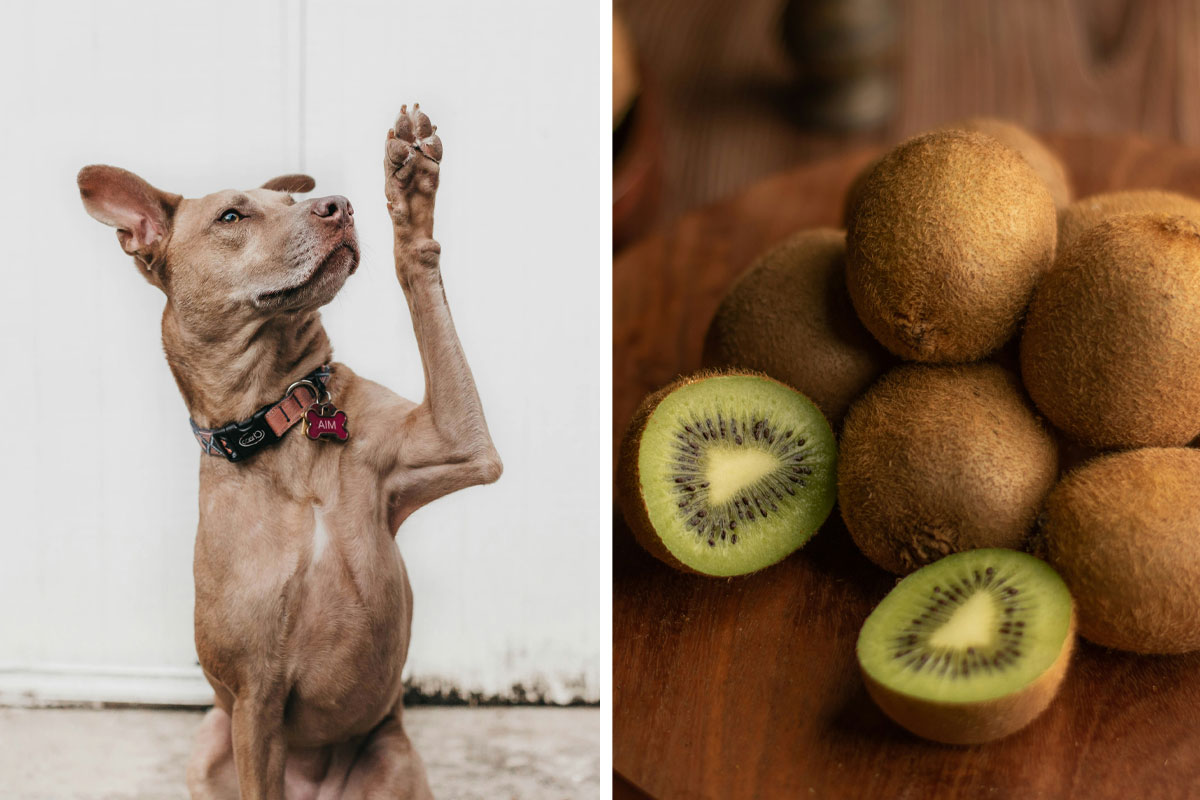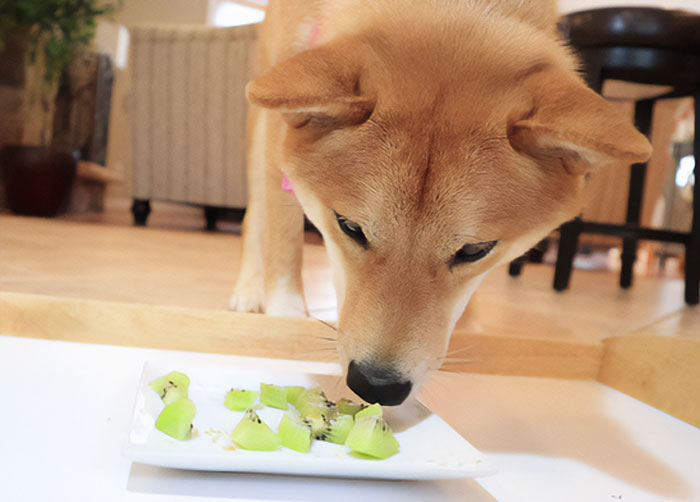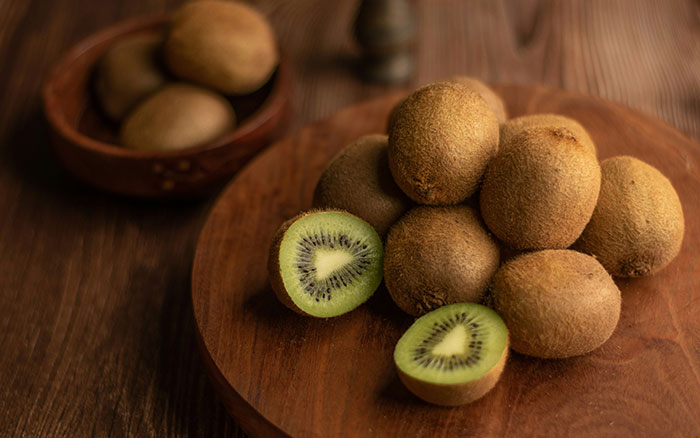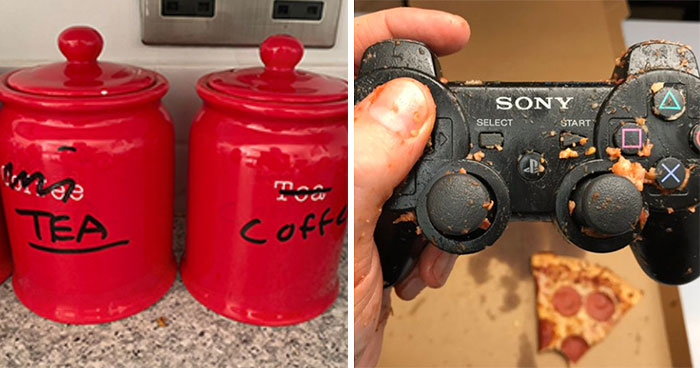As dog owners, we all want to provide our furry friends with the best possible diet that will keep them healthy and happy. Occasionally our beloved dogs are eager to eat whatever we are eating, however, with so many human foods available, it can be challenging to determine which ones are safe and appropriate for our dogs. One of the fruits that often comes to mind is kiwi.
- Kiwi is safe for dogs in moderation, but owners should use caution.
- Potential choking hazard from kiwi seeds and hard center.
- Kiwi's high fiber can cause digestive upset in dogs.
- Skin and seeds contain oxalates, which can be toxic in large amounts.
- Kiwi offers dogs vitamins like C and potassium but should be a treat.
The question of whether dogs can eat kiwi is a common one, and the answer is yes, but it should be done with caution. In this article, we will explore the potential benefits and drawbacks of feeding kiwi to your dog, so you can make an informed decision about whether it is an appropriate treat to offer your pet.
At first glance, kiwi seems like a healthy snack option for dogs. A nutrient-dense fruit rich in several essential vitamins and minerals, including vitamin C and potassium. However, there are also potential risks associated with feeding this fruit to your furry friend. We will discuss the possible choking hazards, digestive issues, and toxicity concerns pet owners should know about. Furthermore, we will provide guidelines on how to serve kiwi to your dog safely.
The information provided herein is for informational purposes only. Please refer to our disclaimer for more details..
Is Kiwi Safe for Dogs to Eat?
Image credits: Haru the Shiba Inu.
When it comes to feeding kiwi to your dog, the first question that comes to mind is whether it is safe for them to consume. Kiwi in small amounts is not toxic to dogs, and they can enjoy this fruit as a treat or an occasional part of their diet. However, there are some important factors to consider before giving your dog kiwi.
The potential risks associated with feeding kiwi to dogs include:
Choking Hazard (never feed your dog a whole kiwi)
Kiwi has a small size and a hard center that can pose a choking hazard to dogs, especially small breeds and puppies. It’s important to cut kiwi into small pieces and remove the seeds before giving it to your pet. Supervision is also recommended while they are eating to prevent any choking incidents. Dogs could potentially devour wholesome fruits which could in turn potentially block the digestive tract.
Gastrointestinal Issues
Kiwi is high in fiber, which can be challenging for dogs to digest, leading to bloating, diarrhea or an upset stomach. It’s important to introduce it gradually and in small amounts to your dog’s diet to prevent any digestive issues.
Toxicity
Kiwi contains a high amount of vitamin C, which is generally safe for dogs in small quantities. However, the seeds and skin contain oxalates, which can be toxic to dogs if consumed in large amounts. The symptoms of oxalate poisoning include weakness, vomiting, and tremors.
High oxalate contents are not good for kidneys and can pose a risk of development of kidney stones. If you suspect your dog has ingested a significant amount of kiwi seeds or skin, seek immediate veterinary attention.
To ensure the safety of feeding kiwi to your dog, it’s essential to follow certain guidelines:
- Offer kiwi as an occasional treat, not as a regular part of your dog’s diet
- Remove the seeds and peel the skin before serving it to your dog
- Introduce it slowly and in small amounts to see how your dog reacts
- If your dog has any underlying health conditions, consult with your vet before introducing kiwi to your dog.
- Although Kiwi is a safe snack, don’t make it a part of a regular diet.
Is kiwi good for dogs? Potential benefits of feeding kiwi to dogs
Kiwifruit is not only a delicious food for humans but can also be a nutritious addition to your dog’s diet. They are packed with essential vitamins and minerals that can positively impact your furry friend’s health.
Vitamin C: an excellent source of ascorbic acid, which is essential for maintaining a healthy immune system. This vitamin also plays a crucial role in collagen production, which helps to keep your dog’s skin and coat healthy.
Potassium: Another vital nutrient found in this wonder snack is potassium. This mineral is essential for maintaining healthy muscle function and can also help regulate blood pressure in dogs.
Aside from these essential vitamins and minerals, it also contains fiber, which can aid in digestion and promote a healthy microbiome in the gut.
Furthermore, the antioxidants found in kiwi, such as lutein and zeaxanthin, can help protect against free radical damage and promote overall well-being in dogs.
How much Kiwi can dogs eat?
Image credits: Pranjall Kumar.
While kiwi can provide numerous health benefits to dogs, it’s important to remember that moderation is key. Feeding your dog large quantities of kiwi can lead to gastrointestinal upset due to the fruit’s high fiber content.
Additionally, these fruits have a high sugar content, which can be detrimental to dogs with certain health conditions such as diabetes. Therefore, it’s important to consult with your veterinarian before introducing kiwi or any new food into your dog’s diet. Consider the overall health status and feed dog in moderation.
As a general guideline, the recommended serving size of kiwi for dogs is one to two small slices of fruit per day. Small dogs should be given one to two pieces of kiwi, It’s also important to remove the skin and seeds before feeding kiwi to your pet, as they can pose a choking hazard or be difficult to digest.
Always monitor your dog after feeding this fruit and watch for any signs of digestive upset.
Can Dogs Eat Kiwi Skin?
Skin is not toxic and the dogs can eat it, but it is advisable to always peel the skin and cut the kiwi into small edible pieces before giving it to your dog to avoid the risk of choking and gastrointestinal upset. If kiwi is not prepared first, dog may ingest the whole piece which can cause bloating because the skin is not digested efficiently.
Can Dogs Eat Kiwi Seeds?
Kiwi seeds are not toxic if ingested in small amounts along with the pulp of the fruit, however, if ingested in very large quantities it may cause gastrointestinal disturbance and oxalate toxicity. Therefore it is best to remove seeds prior to feeding your dog. Kiwi fruit is a safe snack for dogs, however, care should be taken to introduce this little fruit as a treat for dogs adding it gradually and occasionally.
Conclusion
After careful consideration, we can confirm that kiwi is safe for dogs. While there are potential risks associated with feeding this fruit to our furry friends, such as hazards of choking and digestive issues, these can be mitigated by following proper guidelines and only offering kiwi in moderation.
It’s important to consider the size of your dog and any underlying health conditions before introducing kiwi or any new food into their diet. Consulting with a veterinarian can also provide valuable insight into how to best incorporate kiwi into your dog’s meals.
Overall, kiwi can be a nutritious and delicious addition to your dog’s diet, providing them with essential nutrients such as Vitamin C and potassium. However, as with any new food, it’s essential to introduce it gradually and monitor your dog’s reaction.
117views
Share on Facebook
 Dark Mode
Dark Mode 

 No fees, cancel anytime
No fees, cancel anytime 






























-3
0